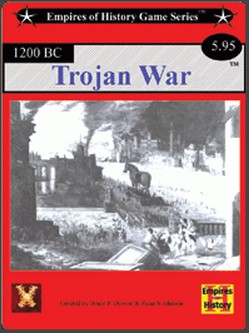Trojan War Board Game
 |
A war out of myth and legend¸ now more likely to be historical fact. The Trojan War is the story told by Homer of the conflict between the Achaeans¸ led by by the Mycenaean king Agamemnon¸ and the power city state of Troy in northwest Asia Minor. The Trojan War board game puts this legendary conflict onto your table top with a massive Greek force having landed on the beaches near Troy and preparing to lay Siege. Only Troy has a formidable military of its own and some of the strongest walls of any fortified city in the ancient world. The Greek force must attempt to lay siege and sack Troy before Troy and its local allies can grow strong enough to challenge the Greek force on the open battlefield. All of the legends come out to play¸ introducing Hero Units such as Achilles¸ and Ajax¸ Hector and Paris¸ Menelaus¸ Odysseus and more. Upon landing the massive Greek army will have a strong military advantage and the Greek forces are back by a more numerous host of Hero Units as well. The Trojan player must decide weather to engage in battle outside of Troy¸ pull everything back behind its safe walls¸ or get part of the Trojan army clear of the city and out into the countryside where it can harass the Greeks and support the troops raised by Troy's allies. As all sieges in classical time¸ supply becomes a critical issue. Namely¸ food. And the Greek army did no bring enough extra to sit outside of Troy forever. Nor do the Trojan have an endless store of food and their ability to grow more inside is limited. Hence the conflict must ultimately spread to involve all of the local city states in northwest Asia Minor¸ all but one of which is an ally of Troy. The Greeks can send detachments of their forces out into the broader game map to sack Troy's lessor allies and steal their saved food stores¸ or the Greeks may embark upon the conquest of those cities and secure extra food production every turn. Of course¸ for each city conquered¸ the rest of Troy allies will begin to marshal more of their resources and recruit larger armies. Troy itself can build one new unit per turn and its various allies can build new units ranging from every other turn all the way to one unit every 11th turn. Assuming Greek conquests don't speed up that process. So the Greek army¸ very large at the start of play¸ gets no reinforcements throughout the game while Troy and its allies slowly recruit and field more units. Securing food points to feed the Greek army is a constant challenge and controlling the countryside so that Troy's allies can not get extra food to Troy to help re-supply them is even harder. The longer the Greeks sit outside of Troy the more desperate their situation will become and the more of a threat Troy's allies can become (assuming the Greeks did employ a strategy of trying to conquer them all). Further¸ in following the events from Homer's epic¸ Troy has allies and after enough time passes¸ those allied forces will arrive. First comes the mighty warrior Memnon and his army to assist Troy. Then Penthesilea and her army of Amazon warriors. And lastly¸ the easterly most of Troy's allied cities on the map¸ and also a likely major trading outpost for the Hittite Empire¸ late in the game will receive a sizable Hittite army that will be coming to Troy's aid. If the Greeks have not decimated the Trojan army enough by this point to succeed in an outright siege of the city walls they will have little choice left but to try the Trojan Horse gambit. A desperate move¸ but the Greeks best chance of getting fighting men inside the city. And by game rules¸ the longer the Greeks can wait to employ this tactic¸ the more likely it the ruse will be believed by the Trojans... The Trojan War Board Game comes with a 11" x 17" map of western Asia Minor with Troy and its allies¸ plus a 8 1/2" x 11" zone map of the city of Troy itself.